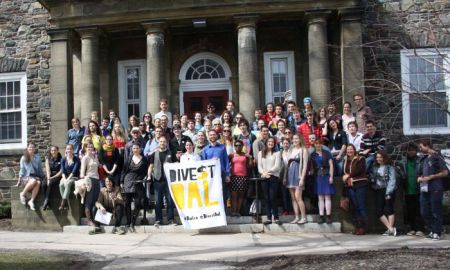K'JIPUKTUK (HALIFAX) – When their school failed to lead, Dalhousie students took matters into their own hands.
On Wednesday December 3rd the Dalhousie Student Union (DSU) became one of the first student unions in Canada to divest their holdings in any of 200 fossil fuel companies blacklisted for their role in hastening climate change. This move came little over a week after Dalhousie University’s board of governors voted against divestment.
Dalhousie University’s endowment fund is presently invested in 35 of the 200 companies blacklisted by the divestment movement. This amounts to approximately $20.3 million or 4.3 per cent of total investments.
“November 25 was…it was disappointing to see,” said Divest Dal organizer Evelien VanderKloet, speaking for the organization promoting divestment on campus. VanderKloet said their efforts are supported by over 2,000 students, 120 faculty members, the school’s faculty association and both the King’s and Dalhousie student unions, which made the Nov 25 vote all the more difficult to accept.
The divestment movement began in the United States as a means of “bringing climate justice to campus” in VanderKloet’s words. It quickly spread to Canada and now exists in force at colleges and universities across the country.
The movement makes three demands of educational institutions: first, the freezing of all new investments in the 200 blacklisted companies; second, the divestment of all current holdings in those companies over the next 4-5 years; and third, the institution’s investments becoming public knowledge.
Divest Dal has been in operation approximately two years and was one of the first such organizations in Canada. They’ve met with Dalhousie’s board of governors seven times, which led to the November 25th vote.
“As much as it was disappointing that divestment was not committed to by the administration on that day, I also see it very much as an ignition point for this campaign,” said VanderKloet.
She went on to say Divest Dal now knows where the board of governors stands on the issue of divestment.
The DSU’s position on divestment was much better known, because in the fall of last year, the DSU voted unanimously in favour of endorsing Divest Dal and their demands for fossil fuel divestment.
Their more recent vote to divest their own holdings, however, came as a surprise even for members of Divest Dal.
“We didn’t really know when this vote would happen or if it would happen or how it would even go,” said VanderKloet. “It did come a little bit out of nowhere, but I also felt the timing of it was incredibly symbolic, with it only being a week after that board of governors vote where the administration said no to divestment. To have the student union stand up and say, ‘we’ll lead the way…we’ll take it from here…’”
The DSU’s recent divestment, although small compared to the investments of the university, amounted to $99,317, or 4.1 per cent of their investment portfolio.
“I hope the administration sees this and the 18,000 students that the student union represents and starts to consider all of those arguments to divest,” said VanderKloet, “and follows the leadership of the students.”
By voting against divestment in late November, Dalhousie University passed up the opportunity to be the first post-secondary institution in Canada to divest. The very next day, Concordia University took that title by undertaking a partial divestment of $5 million.
A representative from the Dalhousie Student Union could not be reached for comment.



